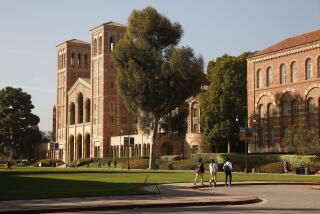Germ Library’s Inventory Is Making Detractors Queasy
ROCKVILLE, Md. — In need of a lethal dose of anthrax? A toxic fix of botulism? Some pesky tetanus, typhoid or cancer cells?
All that and more are just a phone call away.
Mail-order bacteria, fungi and viruses are the specialty of the American Type Culture Collection, a vast microbial library run out of an office building in this Washington suburb.
Scientists rely on the organization, a nonprofit repository of biological materials founded in 1925, for carefully cultured, freeze-dried microbes. Its catalog of tens of thousands of specimens has been called the Sears, Roebuck & Co. for researchers the world over.
“It provides an invaluable resource,” said UCLA microbiologist Sherie L. Morrison, who is on the institution’s board of scientific directors. “They provide the gold standard of molecules.”
Not everyone who calls aims to expand the frontiers of science.
The Iraqi government received 70 shipments of anthrax and other disease-causing pathogens from the organization in the mid-1980s and used them to help build the biological weapons program that is at the center of the country’s dispute with United Nations weapons inspectors, according to government sources and records.
Such shipments were not only legal but received the approval of the U.S. Commerce Department. In the years since, the United States has joined other nations in attempting to curb the proliferation of potentially dangerous biological and chemical materials.
Another customer was Larry W. Harris, the rogue microbiologist detained recently in Las Vegas. When he was arrested, Harris was on probation for using bogus credentials to purchase $300 worth of bubonic plague bacteria from the repository in 1995. The latest substance found in his possession was not potentially deadly anthrax bacteria, as authorities first suspected, but a harmless anthrax vaccine.
Despite those past questionable associations, the organization is a well-respected pillar of the scientific establishment with a board of directors made up of top immunologists, microbiologists, agronomists and other specialists. That makes it all the more difficult for lab-coated officials to see their group tied even remotely to bacteriology in Baghdad or homemade botulism brews.
Tougher laws restrict access to potentially dangerous microbes, from both home and abroad. But the organization’s ill-fated shipments show the inevitable danger posed by the tiny creatures that are key medicine and research tools but also can wipe out populations.
“The problem with biological weapons is that most if not all of the agents and technology have legitimate civilian purposes,” said Javed Ali, research associate at the Chemical and Biological Arms Control Institute, a think tank in Alexandria, Va.
Such civilian uses represent the bulk of the repository’s rapidly growing trade. Its shelves include animal cells (from whales to pandas) essential for researchers, more than 100 human tumor cells used in cancer studies and microbes such as Thermus aquaticus, which was vital to the DNA fingerprinting technique used in the O.J. Simpson trial.
To keep its stash frozen even if the power goes out, the repository has an electric generator and liquid nitrogen on hand. It also stores sensitive biological data in a vault and duplicate samples in off-site freezers.
With a staff of more than 100 scientists and an operating budget exceeding $10 million, the group has outgrown its 30-year-old quarters in Rockville and will move soon to a new facility in Virginia’s Prince William County.
Most of the rural county’s public officials are welcoming the group with open arms--and hefty economic incentives. The repository, they say, will create jobs and opportunity by attracting other biotechnology firms.
But county Sheriff E. Lee Stoffregen III has worried openly about whether the company might also draw international terrorists seeking deadly bacteria from its supply shelves. Officials have dismissed such concerns in the past by stressing the round-the-clock security at their facility.






